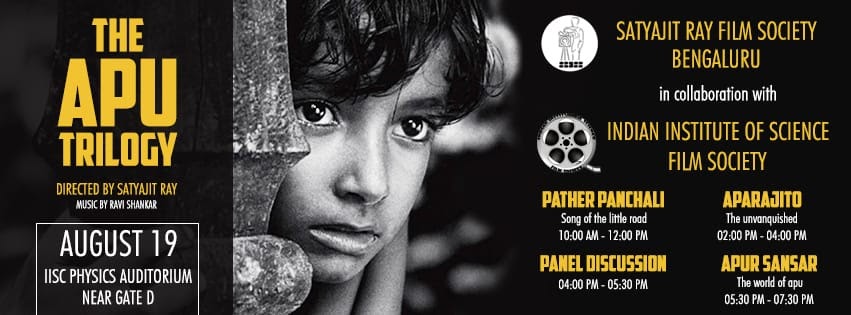
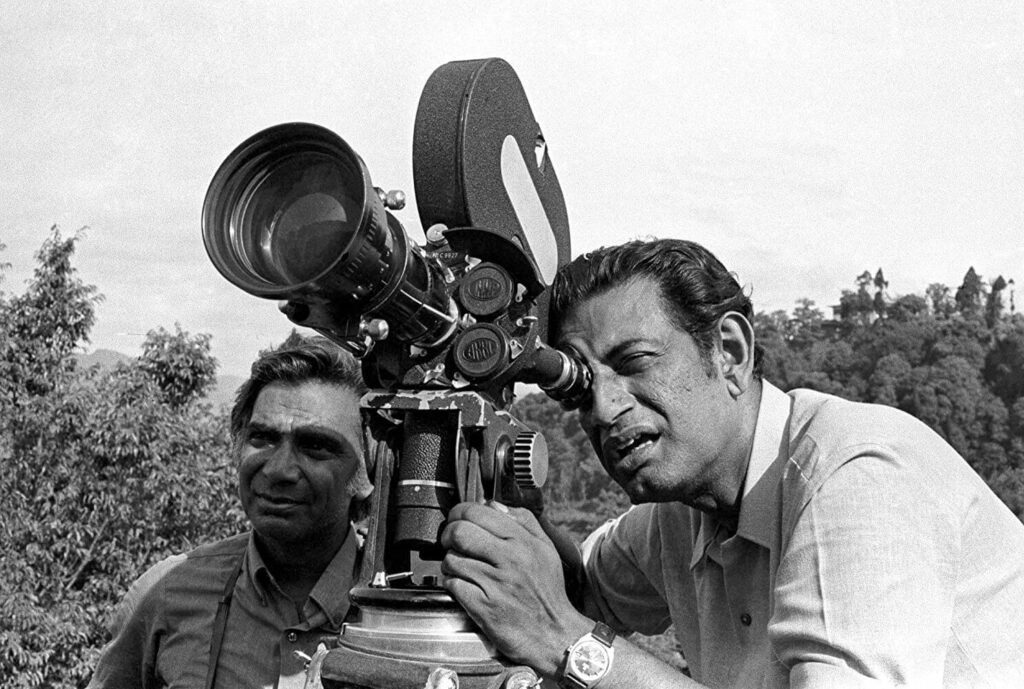
The Apu Trilogy comprises three Bengali films directed by Satyajit Ray: Pather Panchali (1955), Aparajito (1956) and The World of Apu (1959). They are frequently listed among the greatest films of all time and are often cited as the greatest movies in the history of Indian cinema. The original music for the films was composed by Ravi Shankar.
They are based on two Bengali novels written by Bibhutibhushan Bandopadhyay: Pather Panchali (1929) and Aparajito (1932). The three films went on to win many national and international awards, including three National Film Awards and seven awards from the Cannes, Berlin and Venice Film Festivals. Produced on a shoestring budget using an amateur cast and crew, the trilogy is a milestone in Indian cinema and remains one of the most acclaimed works in the Parallel Cinema movement.
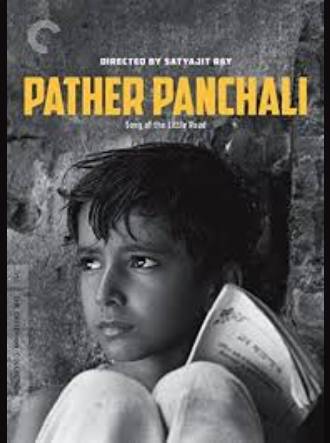
The story of a young boy, Apu, and life in his small Indian village. His parents are quite poor – his father Harihar, a writer and poet, gave away the family’s fruit orchard to settle his brother’s debts. His sister Durga and an old aunt also still lives with them. His mother Sarbojaya bears the brunt of the family’s situation. She scrapes by and sells her personal possessions to put food on the table and has to bear the taunts of her neighbors as Durga is always stealing fruit from their orchard. Things get worse when Harihar disappears for five months and Durga falls ill. Even after Harihar returns, the family is left with few alternatives.
President’s Medals
National Film Awards
Cannes Film Festival
Berlin International Film Festival
British Film Institute Awards, London Film Festival
Edinburgh International Film Festival
San Francisco International Film Festival
Vancouver International Film Festival
New York Film Festival
Stratford Film Festival
National Board of Review Awards (United States)
Kinema Junpo Awards (Tokyo)
Bodil Awards (Denmark)
British Academy Film Awards (United Kingdom)
Other awards
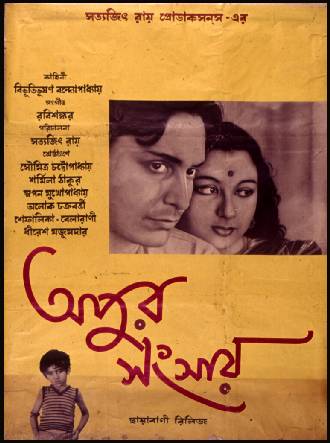
Apu is a jobless former student dreaming vaguely of a future as a writer. An old college friend talks him into a visit up-country to a village wedding. This changes his life, for when the bridegroom turns out to be mad, Apu’s friend asks him to become the husband. After initial revulsion at the idea, Apu agrees. Apu takes his exquisite bride, Aparna, back to Calcutta. But Aparna dies while giving birth. Apu leaves Calcutta, crazy with grief, and his son Kajal is left abandoned with his wife’s parents. Only after a long period of total indifference to worldly responsibilities, does Apu become capable of returning to the world.
Official Poster Courtesy: Internet Archive (archive.org)
Cast & Crew
Director : Satyajit Ray
Producer : Satyajit Ray
DOP : Subrata Mitra
Screenplay: Satyajit Ray
Sound / Music : Vijay Raghav Rao
Cast : Soumitra Chatterjee, Sharmila Tagore, Alok Chakravarty, Swapan Mukherjee
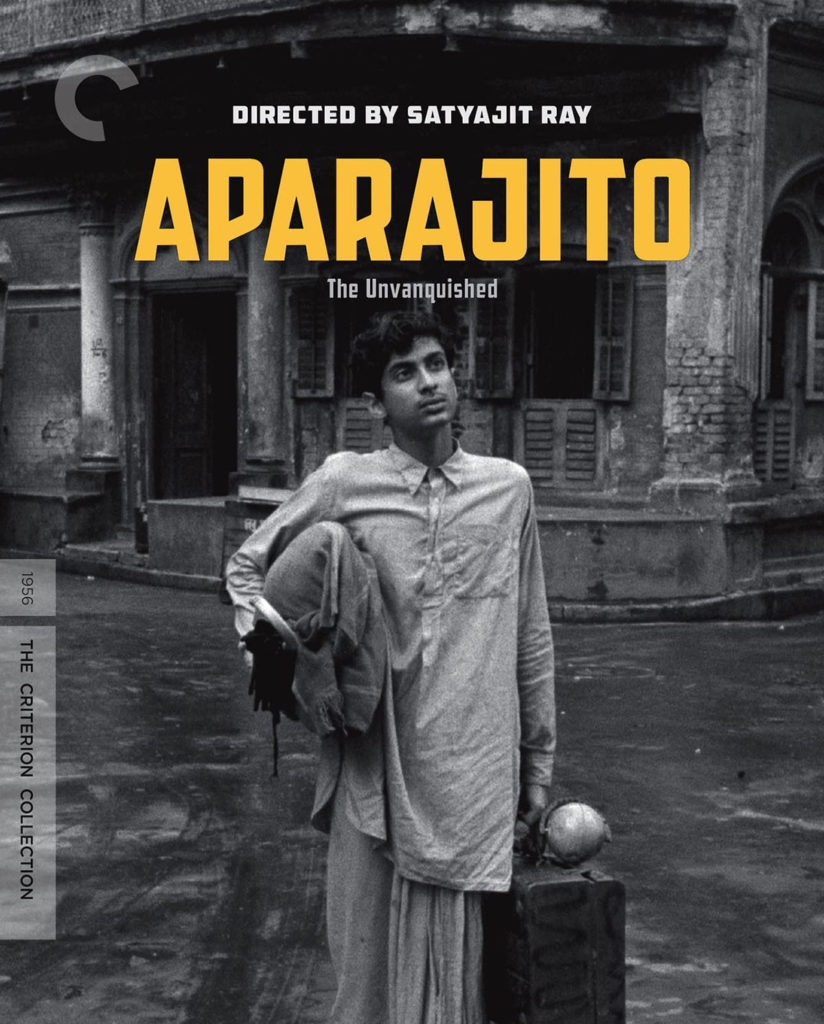
1920. Harihar, Sarbajaya and their ten-year-old son Apu, live in the Temple City of Banaras (Varanasi) on the banks of the holy river Ganga (Ganges). Harihar earns a meager living by reciting religious scriptures. The film opens with Apu wandering and exploring the city. He also encounters their neighbor Nanda Babu, who would soon make a pass at Sarbajaya.
Harihar falls ill with fever and collapses at the riverbank. In the early hours of the next morning, Sarbajaya wakes Apu to fetch holy water from the river to put in his father’s mouth as he is dying. Harihar’s death leaves mother and son to fend for themselves.
The mother decides to return with Apu to live in a village where an old uncle works as a priest. Apu’s mother works to support the family. Apu is initiated into priesthood and takes over the old man’s work. He is unhappy because he wants to go to school. Apu persuades his mother to send him to school. She makes sacrifices so that he might pursue his studies.
Apu, now sixteen, wins a scholarship and departs for Calcutta, leaving her alone. It breaks Sarbajaya’s heart, but she relents. Her health is failing, and the loneliness in the village takes its toll.
Engulfed in city life – studying during the day and working in a printing press at night to pay for his expenses – Apu grows away from his mother. His visits get shorter as the time passes. This emotional distance unnoticed by the growing Apu, hurts Sarbajaya deeply. She waits silently for her son’s visit as her illness accelerates and falls into a depression.
On a night sparkling with dancing fireflies, Sarbajaya dies. Apu comes back to an empty house. He grieves for his mother, but soon finds strength to leaves the village for the last time, to carry on with his new life in the city.
Credits |
|
| Producer: | Epic Films (Satyajit Ray) |
| Screenplay & Direction: | Satyajit Ray; based on the novel “Aparajita” by Bibhutibhushan Banerjee. |
| Cinematography: | Subrata Mitra |
| Editing: | Dulal Dutta |
| Art Direction: | Bansi Chandragupta |
| Sound: | Durgadas Mitra |
| Music: | Pandit Ravi Shankar |
| U.S. Distributor: | Merchant-Ivory/Sony Pictures Classics |
Cast |
|
| Harihar, the Father: | Kanu Banerjee |
| Sarbajaya, the Mother: | Karuna Banerjee |
| Boy Apu: | Pinaki Sen Gupta |
| Adolescent Apu: | Smaran Ghosal |
| Bhabataran, old uncle: | Ramani Sen Gupta |
| Nanda Babu: | Charaprakash Ghosh |
| Headmaster: | Subodh Ganguly |
source: SatyajitRay.org